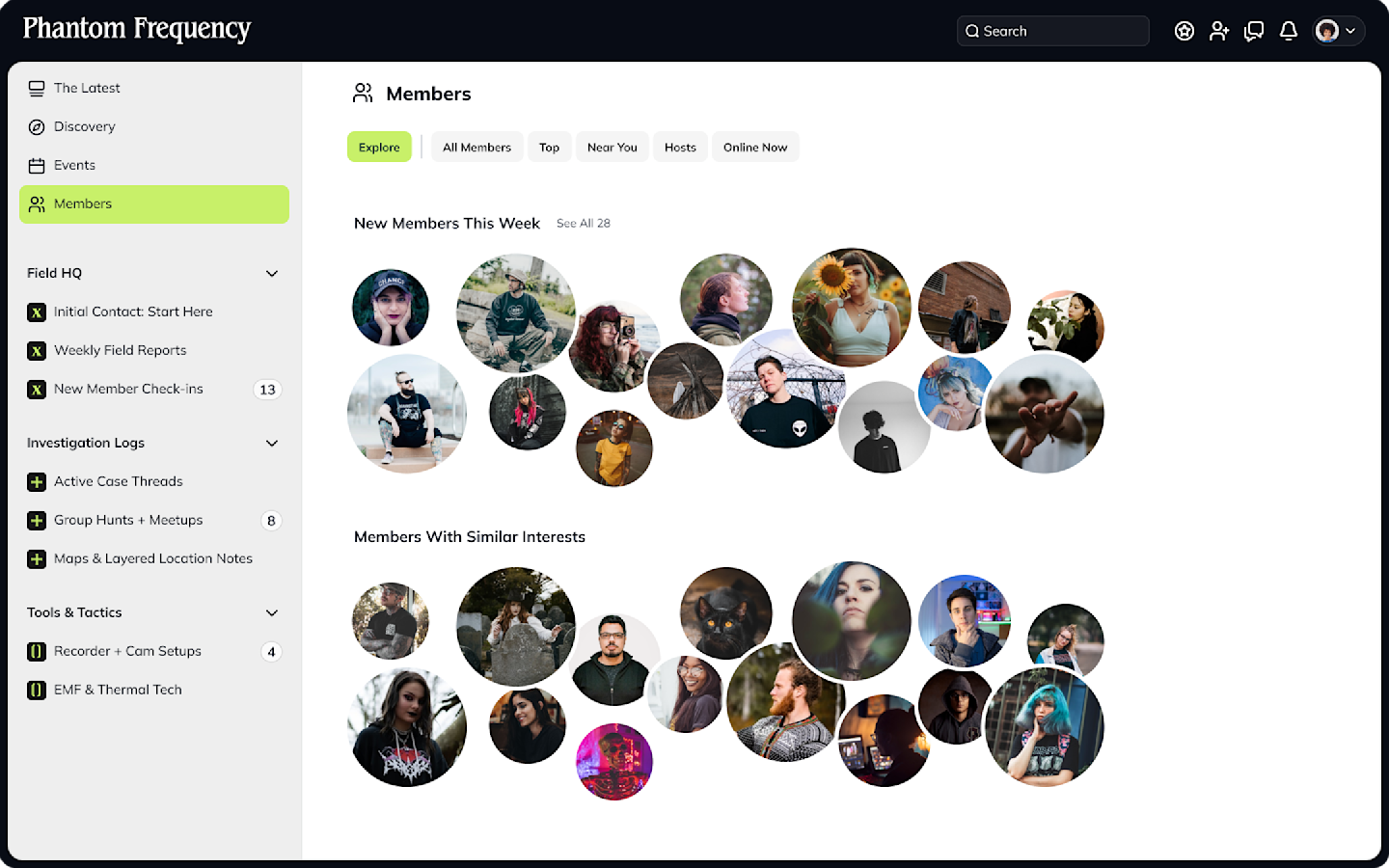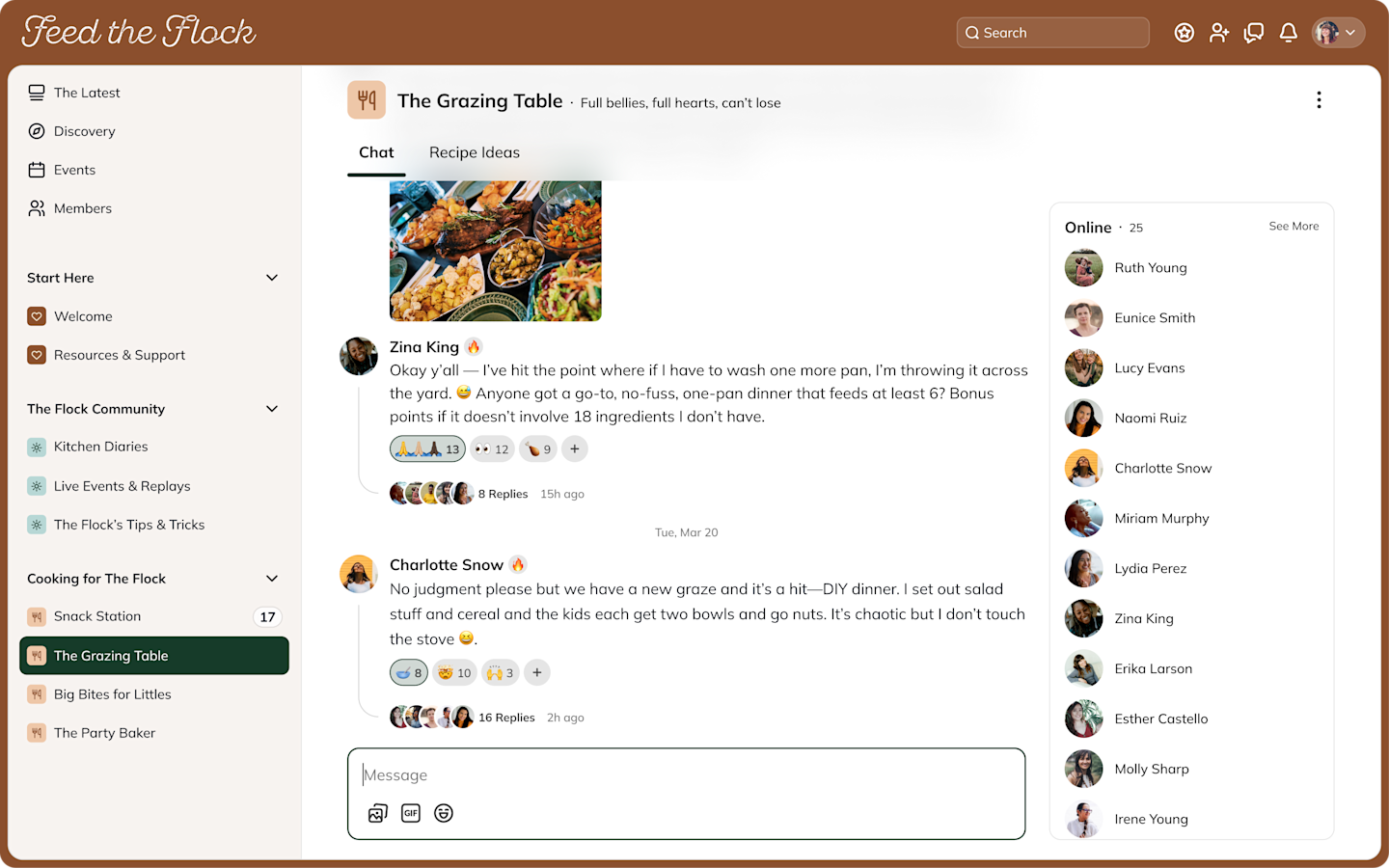Coaching
How to Start a Mastermind Group (12 Steps)
If you’re thinking of launching your own mastermind group, this article will help you decide if it’s right for you and walk you from idea to launch!
Author
Mighty Team
Last Updated
February 10, 2026

Table of Contents
- What is a mastermind group?
- Benefits to a Mastermind Group
- How to start a mastermind group (12 steps)
- 1. Create your tentative big purpose
- 2. Selecting potential Ideal Members
- 3. Solidify your big purpose
- 4. Choose a mastermind platform
- 5. Set your group rules
- 6. Set a price
- 7. Decide on a meeting frequency
- 8. Set a time limit
- 9. Decide on a meeting structure
- 10. Onboard new members like a pro
- 11. Get ready to handle conflict
- 12. Start!
- Should you start a mastermind group?
- Conclusion -- Ready to start?
- If you want to keep some of the feel of a mastermind in an online community, here are some ways to do it:
In this article
- What is a mastermind group?
- Benefits to a Mastermind Group
- How to start a mastermind group (12 steps)
- 1. Create your tentative big purpose
- 2. Selecting potential Ideal Members
- 3. Solidify your big purpose
- 4. Choose a mastermind platform
- 5. Set your group rules
- 6. Set a price
- 7. Decide on a meeting frequency
- 8. Set a time limit
- 9. Decide on a meeting structure
- 10. Onboard new members like a pro
- 11. Get ready to handle conflict
- 12. Start!
- Should you start a mastermind group?
- Conclusion -- Ready to start?
- If you want to keep some of the feel of a mastermind in an online community, here are some ways to do it:
Over the past decade, mastermind groups have gone from being the quiet practice of a few entrepreneurs to a widespread cultural movement. And it’s not because they’re a fad. Mastermind groups are powerful, and they have real, transformative effects on their members.
When personal development author Napoleon Hill coined the term mastermind group in the early 1900s, it came from his study of some of the most successful people in his day. He realized that they didn’t build their empires alone. They worked closely with other people, coming together to form what Hill called a mastermind–to encourage each other towards success.
This is the principle behind a great mastermind group, walking a journey together towards greatness at something. In this article, we’ll talk about who should start a mastermind and who shouldn’t, and we’ll cover everything you need to know about getting a successful group off the ground.
If you’ve been thinking about launching a mastermind group but don’t actually know how to start, this article will teach you all you need to know.
If you want more support in building your online community, come join OUR Mighty Community for free and meet other new and established community owners! We’d love to meet you. Join for free!
What is a mastermind group?
A mastermind group is a community of peers who gather to support each other in gaining mastery over a subject. Usually, the peers have a similar level of knowledge and competence to bring to the group, but all have slightly different skill sets and experiences in a shared domain.
Mastermind groups are common among entrepreneurs but are gaining popularity in other spaces such as careers, investing, and personal development.

Benefits to a Mastermind Group
Deep mastery of a subject
Growth from group experience
Horizontal power dynamics (as opposed to coaching which is vertical)
Amazing networking opportunities
Accountability
How to start a mastermind group (12 steps)
1. Create your tentative big purpose
One of the first things you can do as you start your mastermind group is to create a tentative big purpose statement. We encourage every community to do this, so it's not unique to mastermind groups. A big purpose statement looks like this:
The reason why we are calling this a tentative big purpose statement right now is that it's a good idea to keep a loose grasp on it, recognizing that it might evolve a bit as you bring your group together.
A mastermind group is so tight-knit and the connections run so deep that one of the best things you can do is to run the big purpose statement by your members and make sure that everybody has total buy-in.
Psst, our community name generator can find your Big Purpose for you! Mighty Co-Host™ runs on Chat GPT and can create a Big Purpose, community name, brand, landing and sales pages, and more. Try it!
Try Our Community Name Generator
Our AI engine is here to help you create a community name that feels like magic. Just share a few words about who your community is for and we’ll get to work.
Examples: coaching clients, meditation novices, vegan chefs, dog lovers, aspiring entrepreneurs, etc.
The names generated by Mighty Co-Host™ are examples only and may be used by other businesses or subject to third-party rights. For more information, check our Terms
2. Selecting potential Ideal Members
The second thing you should do when starting a mastermind group is to think about some potential members. Unlike other types of online communities, where you might open it up to anyone who wants to join, mastermind groups are usually cultivated carefully. It will probably take some work to meet and vet potential members, but do it. It will be worth it for the quality of your group.
Look for members with:
A common domain (e.g. small-business owners)
Experience to share
Openness and kindness
Desire for improvement
We have a free training on finding your Ideal Member here!
3. Solidify your big purpose
The first time you bring your group together is a great opportunity to check that you are all on the same page. Run your big purpose statement by the group and see if they are in agreement with it. You're going to need everybody to buy in. Make sure all the group members know it and commit to it, and make any changes you need to.
4. Choose a mastermind platform
At some point in your collective journey, you might decide to choose a platform to host your mastermind on. Not every mastermind group needs a platform. But we've learned from experience that a great platform can add so much value to a group, give you a place to bring important discussions together, and help the group stay in touch between meetings.
In short, a good platform gives you the space to set up and host great conversations.

5. Set your group rules
As you bring a group together, you should also establish some community guidelines. Obviously, these can and should deal with important subjects like respect and safety.
But a mastermind group isn't your average community.
Some mastermind groups, for example, require almost 100% attendance. For these groups, if you miss more than one meeting, you’re out. This might sound a little bit extreme, but it's an example of how seriously some mastermind groups take what they do. For some members, this might seem like overkill. But for some, it's just right. If they're going to invest the time in building deep connections to group members, they want to make sure those members are in it for the long haul.
6. Set a price
You don't have to charge for your mastermind group, but some do. Some mastermind groups charge a lot. The money can help to pay for group expenses, like a platform or the moderator’s time and preparation. But it actually goes deeper than this.
As we often say around pricing memberships and online communities, people value what they pay for. Putting a real, monetary value on your mastermind group means that your members have some skin in the game. Believe it or not, this is going to increase the chances that they get what they need from the group and take it seriously.
7. Decide on a meeting frequency
You can decide this on your own or together, but it's important to establish how often your mastermind group will meet. Resist the urge to meet too frequently. If the group becomes too much of a time commitment, people may resent it.
Your members should have time in between meetings to implement things that you've discussed; this will help them to feel real progress. It can be a challenge to feel progress on a week-to-week basis. Meeting once a month or once a quarter might be a better option to actually help your members realize their growth.

8. Set a time limit
Some mastermind groups meet indefinitely, but some leaders swear by having a time limit. Consider setting the time limit of your group for three months, six months, or a year.
Commit to ending it at that point, or at least having a group conversation about whether you want to keep going.
This time limit helps to keep your group focused and time-bound, and it will give your members an out if they are not getting what they need from it. It will also give you opportunities to take a break from the group before reflecting on whether you want and need to start another session.
9. Decide on a meeting structure
One final thing you can think about when creating a mastermind group is what your meetings will look like. If you are only meeting for one or two hours every month, how do you make the most of that time? How do you make sure nobody monopolizes the discussion?
Set a clear meeting structure, and communicate it to your members. For example, you might ask certain members to bring a problem they are working on for the group's input, and then give someone different an opportunity the next month. You might have an opportunity to go around the circle and have every group member share something they're struggling with or something they learned. You might devote some time to having members identify goals they want to achieve by the next meeting.
You decide, but make sure you have enough structure in place to make the meetings valuable.

10. Onboard new members like a pro
Absolutely create a welcome sequence! You can automate this, for example, with emails. Or, you can use the built in welcome option on your community software. It should include helpful tips for navigating your mastermind platform, intro prompts, and what to expect.
For example, here are some of the main prompts in a Mighty Networks welcome checklist (these can be edited).
Prompt members to fill out their profile
Members can customize notifications (
Reminds members to download the app
Encourages the first post, comment, or reaction
You can also create custom welcome Spaces, write a welcome article, or connect an email sequence. Great onboarding reduces issues later, and helps members know where to go if they do have questions.
Here are some extra welcome items to elevate the experience even more.
Invite newcomers to an orientation event.
Offer a hangout or office hours.
Assign accountability partners.
Ask existing members to personally welcome new members.
11. Get ready to handle conflict
Nobody wants it, and it’s not that common, but members need to know how you’ll handle conflict.
Set ground rules for privacy and difficult mastermind conversations.
Incorporate moderation (and perhaps moderators) to flag and deal with any problem content in a mastermind group platform.
Set the expectations around behavior, meeting etiquette, and attendance requirements (and follow through).
Model vulnerability and openness as a mastermind facilitator.
Deal with problems quickly as they arise. Don’t let things fester.
While every online community needs ground rules, it’s arguably even more important for mastermind groups. People are being vulnerable, sharing everything from emotional states to business data. They need to feel safe.
12. Start!
Unlike other communities that evolve as you go, with a mastermind group you have probably done a lot of the work up front. If you’d like to learn how to run a mastermind group effectively, we have step-by-step resources to guide you.
So now, the only real thing left to do is to start! Get your members together for your first meeting, and start growing! Good luck!
And if you’re looking for a place to host it, check out the platform we’ve built! You can try it for free–no credit card required.
Should you start a mastermind group?
5 Reasons you should start a mastermind group
You have mastery of something and you want to get better
Just as the name suggests, a mastermind group is not for amateurs. A mastermind group is for people who already have a certain level of mastery in their field, and they want to get even better. A mastermind group thrives on mutual benefit; the members have to learn from each other.
If you bring together a group of people who have little to no experience in their shared domain of interest, they won’t be able to share their knowledge in a way that’s valuable for everyone.
You want to round out your expertise
Although every mastermind group has mastery at its core, it’s still important to understand that group members are often masters of different things. In this way, when members come together, they each bring unique expertise and perspectives.
A mastermind group of entrepreneurs might have members with different competencies: product development, funding, and online marketing, for example, and each member will have a different story and have learned different things. Sharing that unique knowledge and perspective is what makes a group work well.
You have a clear niche
Just because you want unique perspectives in a group doesn't mean you should have totally different people. On the contrary, you should have a really clear niche for your mastermind group. "Entrepreneurs" might even be too big of a niche. The more focused you can get with your definition of an ideal member, the more valuable the group can be. "Investors in commercial real estate" or "CMOs at major tech companies" would be great examples of focused mastermind groups.
You want to grow your network
It shouldn't be a secret that one of the top reasons industry leaders join mastermind groups is to grow their network in a meaningful way. When Napoleon Hill wrote about mastermind groups, this was one of his observations. The wealthy people he studied would create mastermind groups, not only for the knowledge they would gain but from the networking and opportunities that flowed from it.
Mastermind groups often lead to collaborations, investment, and a ton of other great things.
You want accountability
Being an entrepreneur or leader in an industry can be really lonely, and it can be really hard to keep momentum on your personal growth. One of the best things about a mastermind group is it keeps members accountable.
When the group meets regularly, it helps group members to be more productive because they know that people will ask about their work at the next meeting.
5 reasons you shouldn't start a mastermind group
You are a rookie
We're not saying you have to have total mastery of your field to create a mastermind group. But you shouldn't be a rookie either. It's totally possible to create a mastermind group of people with more knowledge and experience than you and use it as an opportunity to learn from them. Your gift to them can be setting it up and doing the hard work of keeping it moving.
However, the masters you bring together need to see you as a peer to create a proper group. As a mastermind group leader, you are not just a rookie trying to learn from them. You are an equal participant who can also share knowledge.
You want to coach
Unlike coaching, mastermind groups have horizontal power dynamics. What this means is that it's a community of equals who share equal knowledge. The host is not a coach; they’re an organizer and perhaps a facilitator. A good mastermind requires people who are all learning from one another.
If you are an expert in a subject and want to share your knowledge with people who don’t have any, that's fantastic! But we would probably call that a coaching business, and not a mastermind.
You're not ready for commitment
Good mastermind groups require serious commitment; this means busy people must still make the time to show up on a regular basis. This includes you as the leader. If you're not serious about committing to a regular meeting, even if it's only once every month or every quarter, a mastermind group probably isn't the right thing for you. Consider launching some sort of virtual summit instead, that will give you a ton of value but won’t require a long-term commitment.
You haven't dealt with your own stuff
Cards on the table, this mastermind group is not therapy. You definitely should learn and grow in it. But if you have serious stuff you need to work on, it might be better to do that first.
You don't know anyone else who wants to join
One final thing, a mastermind group will take other people. It needs to be carefully cultivated to make sure that it has maximum trust and safety. It's a place for people to get real. So don’t start a mastermind group until you’ve had a few conversations with some potential members.
Do some networking with people who would be in your ideal group, and find out what they want and need from a mastermind group. This doesn't mean you aren't going to start a group! It just means you should do the leg work first to make sure that there is a hunger for your group in your particular niche. As a bonus, this process will also help you assess who would actually be a good member, and who wouldn't.
How to grow your mastermind group
Here are some quick tips for growing your mastermind group business!
Keep focused on one Ideal Member. The business doesn’t grow with a scattershot approach. By focusing on getting results for one person in transition, you have the potential to scale more.
Choose an Ideal Member who is excited and dedicated to growth. A mastermind is hard work, and it can be intense. You want people who are going to do the work, both in the meetings and between.
Let your members invite others. But make it clear who your Ideal Member is, and make sure to still vet people–even if a member vouches for them. (Warn your members that you’ll do this!)
Create a waiting list if you have a lot of interest in your mastermind group.
Post about your group in industry forums, on relevant sites, or social pages.
Attach a community! Adding an online community to a mastermind group can create a network effect and help you scale.
Conclusion -- Ready to start?
If you've read this whole thing and are EXCITED about launching your mastermind group, that's awesome! Let's harness that energy into getting started.
You can get going right now for free with your own Mighty Network.
Ready to launch your mastermind group?
FAQs
1. Should I use AI for my mastermind group?
AI and automations can definitely be a great fit for running a mastermind group! They can free up your time as a host and make the business stronger. Here are some ways to use it.
You can use AI and automations to optimize your community management tasks and streamline and automate admin, things like membership status, renewals, or prompting members who haven’t been active in a while.
Use AI to boost engagement! A platform like Mighty lets you create people magic with features like profile assist, showing similarities with other members, and starting a conversation with 1-click. For Hosts, this also means 1-click re-engagement of lapsed members. These features use AI to boost engagement.
You can use AI content creation, recording, and summarization tools to build agendas, white-papers, live discussion prompts, or to take notes during a meeting.
AI can follow-up after a meeting, set up your next meeting, write sequence emails, and ask for feedback.
If your platform has automations, you can also gamify mastermind journeys with leaderboards, unlocks, awarding points, and celebrating wins.
2. How can I tell if my mastermind group is a success?
Ask members! If you have a good rapport and built-up trust, members should be willing to say what is and isn’t working–even live in a session.
Check if members are hitting their goals. Setting clear goals from the outset helps you measure whether members are reaching them!
Try anonymous surveys or feedback. Although it can be tough in a small group that knows each other well, these can still add an extra layer of psychological safety.
Check your business metrics. If you’re running a mastermind, you want to see consistent profits and low churn. If people are leaving quickly, you have a problem–either you’re not finding your Ideal Member properly or you’re not delivering the value they expect.
3. How many members make the "ideal" mastermind group, and why?
Honestly? 5-8 members is probably the sweet spot. Grow bigger than that and you lose the ability to serve everyone well. Go smaller and you risk not having enough perspective variety and life stories.
If you want to grow beyond this, consider launching spin-off groups or finding other ways to scale. Running things like online courses, events and communities can be great alongside a mastermind group. You can even use these as feeders, getting people started with a digital product and moving the top prospects into the mastermind.
4. What’s the best way to find and vet potential members if I don’t already have a large network?
Start with what you have! Try former colleagues or clients. Post to your social networks, even if you don’t have a huge following. Spread the word!
You can approach your Ideal Members specifically. For example, say you’re looking for small business owners. Start with the ones in your town. Those near you. Ask people. And if they say no, ask if they know anyone else who might be interested.
Join the right communities. This could be online membership sites, in-person conferences, or local business groups. Get to where your people hang out.
Host a free workshop or webinar to give value to the right people.
For vetting, set up an interview or application process for your Ideal Member. It’s up to you what to include, but masterminds often have requirements like business revenue minimums, team size, or a certain position (e.g. CEO, Marketing Director).
It’s honestly worth it to have some sort of a call to vet people. Your group’s dynamics are the biggest contributor to whether your mastermind succeeds or fails. Don’t mess around with this.
5. Should masterminds be free peer-to-peer groups or paid programs led by a facilitator?
Free peer-to-peer groups work best for people with established relationships and people with similar experience levels.
Pros: Can feel more organic and grassroots, no power dynamic, can even be free.
Cons: Less structure and accountability, format gets messy with no facilitator
Paid facilitator-led masterminds work best for people who don’t know each other, and those who benefit from clear structure and goals.
Pros: Intentional facilitating, accountability, members will take it more seriously and often get more value for money.
Cons: Shift in power dynamic, less “organic” conversations, potentially higher cost
6. How often should a mastermind meet to maintain momentum without causing burnout?
There are 2 things to consider, meeting frequency and length of the commitment:
Meeting frequency: Meeting monthly works well for most groups. It gives you time in between to take action items, but doesn’t leave too long between meetings to lose momentum. Bi-weekly can work if you have members committed to meet more often. Weekly is usually too much, and bi-monthly usually isn’t enough. But survey your members to see what works for them!
Commitment length: It can be a good idea to set a hard stop on the commitment length (e.g. 6 months, 9 months). This lets you and your members keep reassessing to make sure the group is still working.
7. What agenda format keeps meetings structured yet flexible for deep dives?
One of the most common approaches is to have brief round-robins mixed with “hot seats” to let 1 - 2 members get really detailed feedback each time. For example, here’s what this could look like:
10-15 minutes: Welcome and round-robin 50-80 minutes: 2 hot-seat discussions 10-25 minutes: Goals for next meeting and closing
8. How do I ensure confidentiality—do we need formal NDAs or just a verbal agreement?
For most meetings, verbal agreement is enough. You might consider NDAs if your members will have proprietary information or are sharing intellectual property or sensitive financial data. Consider how much your members have to lose if their information gets out–this should help you figure out if you need NDAs.
Remember, confidentiality isn’t just a legal formality. Creating psychological safety is also crucial for the success of a mastermind group.
Discuss privacy expectations at the beginning of each meeting.
Include confidentiality in written group agreements.
Model vulnerability and openness.
Remind members that they may choose not to share sensitive information if they aren’t comfortable doing so.
9. What digital tools help track individual goals and shared action items between sessions?
Here’s some of the tech behind great masterminds:
A community platform: Having a digital home that allows for chat and messaging, community discussions, profiles, event scheduling and hosting, and even collecting payments makes for a fantastic mastermind experience. This software is simple to use, and really it’s all you need. A platform like Mighty Networks takes care of everything.
Project management software: It’s a less-popular route, but some masterminds use tools like Asana, Notion, or Trello to share between members. These can be good for organizing ideas and tracking action and growth.
Accountability apps: Some masterminds will use apps like Strides or Habitica to track growth and progress–but make sure it doesn’t become too onerous for your members.
Spreadsheets and forms: It’s oldschool, but some opt to track meetings on spreadsheets, perhaps with members checking in on Google Sheets before meetings.
10. Can a mastermind work asynchronously for members in wildly different time zones?
Possibly, but you lose some of the magic of it. Masterminds work best on deep dives and lots of time spent together. If you can’t get members in the same room (even virtually), consider an online community model instead. This lets members make progress asynchronously.
If you want to keep some of the feel of a mastermind in an online community, here are some ways to do it:
Set livestreams and virtual events still, for those who can make it. Record everything.
Encourage members to share videos if possible, for example, smartphone footage of them explaining a problem and asking for feedback. The video element helps people connect.
If not, encourage members to work on a problem together asynchronously. You can even build it into your community calendar. For example, a “Tough Question Tuesday” can be a great recurring way to work a challenge as a group.
Assign members peer mentoring 1:1 and encourage them to meet regularly if possible.
Have open office hours or virtual events for people to drop in if they can.
What's the difference between a hot-seat and a round-robin discussion style?
Hot-seat format: A few members take turns in the “hot seat” to explain their goals and challenges, with other members helping them work on solutions. It allows for deep dives you don’t always get from round-robins.
Round-robin format: All members take turns sharing their goals and challenges. Everyone gets a turn, but you don’t have the ability to do deep problem-solving that the hot-seat format gives you.
Mixed format: Try both of these! That’s what most mastermind groups do. It lets you do some real problem solving, but also lets everyone feel heard. It’s hard to show up to a group and not get to talk about your stuff.
12. What pricing tiers or payment structures are common for premium, facilitator-led masterminds?
Peer-to-peer masterminds: Usually low-cost, something like $50 - $300/mo to keep people accountable and to cover the costs of a shared platform or space rental.
Facilitator-led masterminds: There’s a huge variation, anywhere from $300/mo to $10,000/mo. The main driver of the cost here is usually the facilitator’s expertise or the net worth or income of the participants. (For example: New business owners earning $60,000/year = $600/mo, Owners with a $10 million net worth = $6,000/mo)
It’s common to expect most if not all of the payment up front, or broken into 2-3 installments. Monthly payments are less common for facilitator-led masterminds, since payment is a symbol of commitment to the full process. We occasionally see masterminds bundled with other offers like courses, events, books, etc.
Don’t underprice your mastermind! It’s important to charge enough to get people to show up and do the work.
13. How long should a mastermind cohort last?
Usually 6 - 12 months is perfect. This gives members enough time to see major improvements in their life or business. It’s also not enough time for the relationships and meetings to get stale. If it’s a new group, consider 6 months to get your feet under you as a facilitator and to make sure you’ve done your vetting and setup right.
As you get better, you can always move to longer commitments.
14. How do I handle a member who dominates conversation or consistently misses meetings?
Step 1: Immediately discuss the issues with the participant. You may choose to have a written record (e.g. an email).
Step 2: If the issue does not resolve immediately, consider banning the individual from the group. Masterminds are high-touch–you need people who are going to take it seriously for it to work. One bad apple can ruin the whole mastermind.
15. Is it possible to run a mastermind entirely inside a community platform like Mighty Networks?
Yup! It’s not just possible, but it works really well! Mighty takes care of everything, from your payment processing to your meeting hosting to scheduling to in-between chatting. Mighty is G2’s top-rated community platform, and it’s home to more $1 million communities and masterminds than any other platform.
Try it free for 14 days!
Ready to start building your community?
Start a free 14-day trial to explore Mighty—no credit card required.
More like this
Join Mighty Community
Learn the principles of Community Design™ (and see them in action) alongside thousands of creators and entrepreneurs. It's free to join!

Online Courses
Creating a Course
Teaching a Course
Course Platforms
Selling a Course
Communities & Memberships
Community Platforms
Managing a Community
Building a Community
Growing a Community
Monetizing a Community
Creators & Entrepreneurs
Monetization
Content Creation
Starting a Business
Website Builders
Creating & Managing a Website
Events
Event Platforms
Hosting & Marketing Events
Branded Apps
Creating a Mobile App
Coaching Apps
Community Apps
Coaching
Mastermind Groups
Starting a Coaching Business
Coaching Platforms
Filter by Category
Online Courses
Communities & Memberships
Creators & Entrepreneurs
Events
Branded Apps
Coaching
Start your free trial
14 Days. No Credit Card Required.


















